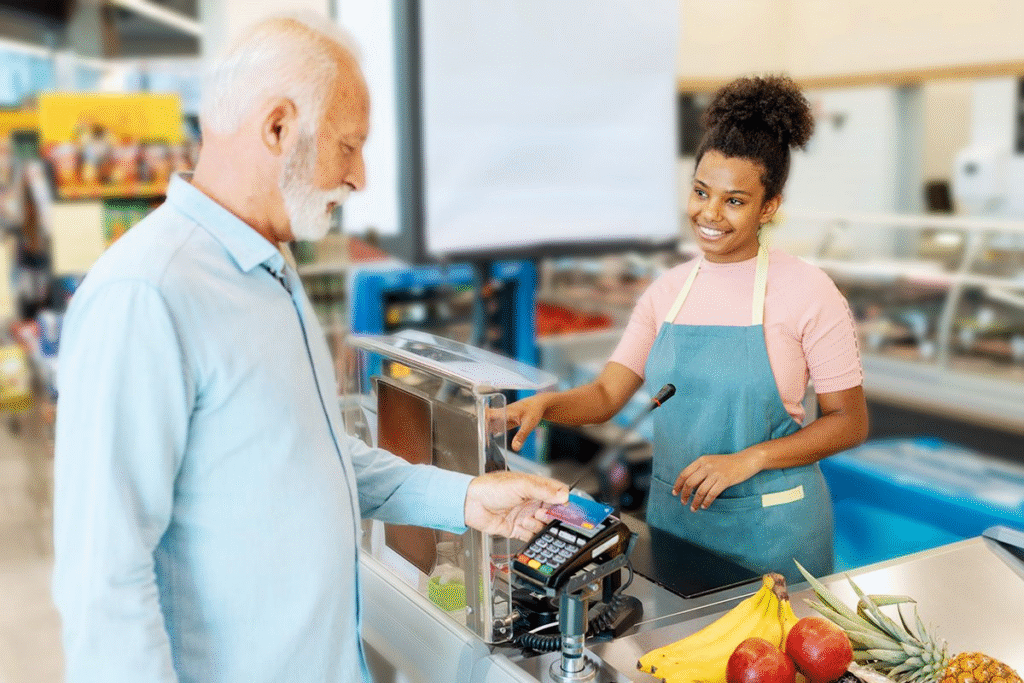Medicare Grocery Allowance and Flex Cards

In recent years, some Medicare plans have begun offering benefits such as grocery assistance or flexible spending cards. However, the hype surrounding these cards often oversells what the product offers and makes them sound more readily available than they actually are. We’re going to explore grocery and flex cards in more detail to help you recognize scams and better understand this additional benefit.
What are Medicare grocery allowance and flex cards?
Grocery and flex card offerings are additional benefits provided in some Medicare Advantage plans. These benefits are typically reserved for select Dual Eligible Special Needs Plans (D-SNPs) or Chronic Condition Special Needs Plans (C-SNP), which serve those with income limitations and those with long-term health concerns. Most Medicare Advantage plans do not offer cards for grocery or flexible spending cards as a standard benefit and other types of Medicare do not offer this benefit at all. These are special benefits for those who qualify, and only offered in certain areas.
Medicare grocery allowance cards
Grocery cards are called Medicare Food Allowance cards and are part of the Medicare Grocery Benefit. This benefit is designed to help low-income seniors afford fresh produce and to promote healthy eating habits. In most cases, the purchases made using this benefit must be healthy food options, such as fruits and vegetables. Exact rules and specifications will vary by plan.
Medicare flex cards
Medicare flex cards are special debit cards that may be available in select plans. The purpose of a Medicare flex card is to help those with lower incomes cover certain qualifying medical costs that might not be covered in their D-SNP plan, such as dental treatments and services. The exact rules and regulations for what Medicare flex cards can be used for will depend on the provider and plan. The average payout is around $500, which is significantly less than the $2,000+ seen on some Medicare advertisements. Flex cards are not free money; they are a health benefit with specific limitations.
How do Medicare grocery allowance cards work?
A Medicare Food Allowance card can come in one of two ways: a prepaid Visa card or a coupon card. This benefit is reloaded monthly or quarterly, depending on your plan. Most seniors who qualify for this benefit get somewhere between $25–$275 per payment period. And most plans do not have roll over, so you will need to use it before you lose it.
Prepaid debit cards will scan like normal debit cards when checking out at the grocery store, while the coupon card will need to be scanned by the cashier prior to payment. Just make sure that you activate your card trying to make a purchase.
Note: Not all cards are accepted at all grocery stores. Some plans may have limitations on where you can use this benefit. Read your plan information for more details.
How do Medicare flex cards work?
Flex cards are prepaid debit cards with a set amount per year. Exact amounts vary by plan and provider. You can use these funds for qualifying medical expenses. Those may include:
- Insurance copayments
- Prescription and OTC medications
- Dental, vision and hearing care
- Some medically necessary expenses
Some plans may require that flex card funds be used on dental, vision and hearing while others may be less restrictive. You will need to review your own plan information to find out what stipulations your plan may require.
Important reminder about Medicare grocery allowance and flex card benefits
Grocery and flex card benefits are not free money. They are not large sums of money to be used at your discretion. They are set amounts to help those with income limitations afford healthy foods and additional medical expenses. Of the two, grocery benefits are more common, but neither benefit will be available with all Medicare Advantage plans and they may not be offered in your area.
Medicare grocery allowance and flex card scams
Because this benefit is a desirable perk, it is used in Medicare scams. It is important to realize that grocery and flex card benefits that seem too good to be true, or promise “free money” are scams. Scams might say that this is a benefit that comes with all plans or is available nationwide, or overinflate the dollar amount of the benefit.
No matter what type of Medicare plan you’re considering, it is important to do your research. Research what that plan looks like and what coverage it provides, look up the agent you’re working with to see if they have any history of fraud, and make sure you check out the insurance carrier to ensure you are not a victim of fraudulent Medicare sales.
When in doubt, remember these three tips for staying safe from scams:
- Guard your personal information and only share with trusted sources.
- If something seems too good to be true, it probably is.
- Work with a licensed insurance agent.
Conclusion
Grocery and flex card benefits are additional benefits that exist in select Medicare Advantage plans. They can help those who qualify with food and medical costs, but they are not readily available for all Medicare users. It’s important to be wary of scams and offers that seem too good to be true. Do your research to ensure you are getting a legitimate plan that meets your needs without breaking your budget.
Ede’m Now Health Marketplace is a brand operated by Integrity Marketing Group, LLC and used by its affiliated licensed insurance agencies that are certified to sell Medicare products. Ede’m Now Health Marketplace is not endorsed by the Center for Medicare & Medicaid Services (CMS), the Department of Health and Human Services (DHHS), or any other government agency.
